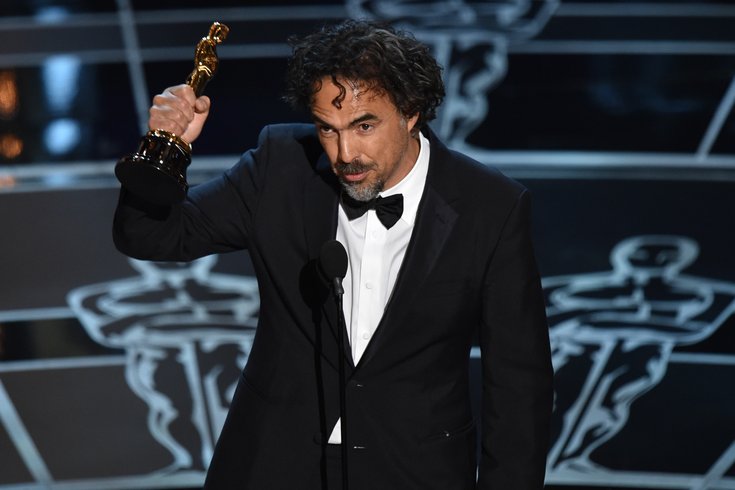
February 22, 2015
 John Shearer/AP
John Shearer/AP
Alejandro G. Inarritu accepts the award for best director for “Birdman or (The Unexpected Virtue of Ignorance)” at the Oscars on Sunday, Feb. 22, 2015, at the Dolby Theatre in Los Angeles.
The dark comedy "Birdman" held up a mirror to Hollywood and its struggling actors and received in return the film industry's highest recognition on Sunday, the Academy Award for best picture.
Director Alejandro G. Inarritu's story of a washed-up, former superhero actor attempting an improbable comeback on Broadway won four Oscars, including best director, the second consecutive win in that category for a Mexican filmmaker.
Inarritu thanked the star-studded audience for seeing his "crazy film."
The reward for the satire hews to an Academy tradition of awarding films that honor the entertainment industry, such as "Argo" and "The Artist" in recent years.
Eddie Redmayne won best actor with his painstaking portrayal of physicist Stephen Hawking in "The Theory of Everything," robbing "Birdman" lead and former superhero actor Michael Keaton of a big comeback moment.
Each of the eight best picture nominees went home with at least one award, but it was a disappointing night for "Boyhood," Richard Linklater's unprecedented endeavor to depict the simple story of a boy growing up over 12 years, all with the same actors. It won one Oscar for its six nods.
Wes Anderson's colorful caper, "The Grand Budapest Hotel" proved popular among the 6,100 members of the Academy of Motion Picture Arts and Sciences who vote for the Oscars, winning four awards on its nine nominations.
"Whiplash," the independent film about an aspiring jazz drummer and his tough mentor from young director Damien Chazelle, won three Oscars.
It was a night in which the controversy over the lack of diversity among this year's nominees was front and center. First-time host Neil Patrick Harris opened the telecast with a quip: "Tonight we honor Hollywood's best and whitest, I mean brightest."
But the race theme resonated in a more serious way too, when Common and John Legend got a standing ovation and made many in the audience cry with their performance of "Glory" from the 1960s civil rights drama "Selma."
It won best song, delivering the sole victory to "Selma," the film at the center of the diversity debate, sparked by the exclusion of ethnic minority actors from the four acting categories. The nominations sparked the Twitter hashtag "#OscarsSoWhite.
"'Selma' is now, because the struggle for justice is right now," said Legend in the aftermath of recent racially charged protests in America.
The Academy rewarded heavy favorites and veterans with their first Oscars in the three other acting races.
Five-time nominee Julianne Moore won best actress for her portrayal of a woman suffering from early onset Alzheimer's in "Still Alice."
Patricia Arquette won best supporting actress for her role as a struggling single mother in "Boyhood," while J.K. Simmons won the best supporting actor as a monstrous music teacher in "Whiplash."
For the biggest televised event outside the sports world, the Academy aimed to attract young viewers who may not care much about the films but who could tune in for the musical acts.
A bridge between the young and old, pop diva Lady Gaga received a standing ovation for her medley of tunes from "The Sound of Music" before introducing that film's star, Julie Andrews.
Poland's "Ida" clinched best foreign-language film and director Pawel Pawlikowski pushed the 45-second acceptance speech boundary to thank "my Polish friends who are in front of the TV, the crew who were in the trenches with us and who are totally drunk now, and you were fantastic."
Best documentary went to "Citizenfour," director Laura Poitras' feature about National Security Agency whistleblower Edward Snowden, the former government contractor who detailed the secret mass surveillance programs.
"The subject of 'Citizenfour,' Edward Snowden, could not be here for some treason," joked Harris.